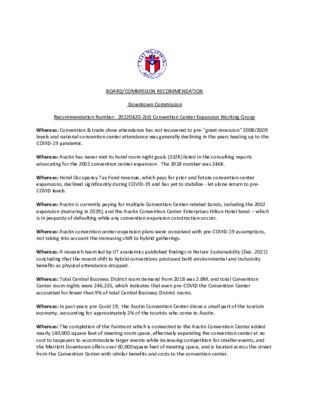Backup — original pdf
Backup

BOARD/COMMISSION RECOMMENDATION Downtown Commission Recommendation Number: 20220420-2(d) Convention Center Expansion Working Group Whereas: Convention & trade show attendance has not recovered to pre-"great recession" 2008/2009 levels and national convention center attendance was generally declining in the years leading up to the COVID-19 pandemic. Whereas: Austin has never met its hotel room night goals (332K) listed in the consulting reports advocating for the 2002 convention center expansion. The 2018 number was 246K. Whereas: Hotel Occupancy Tax Fund revenue, which pays for prior and future convention center expansions, declined significantly during COVID-19 and has yet to stabilize - let alone return to pre- COVID levels. Whereas: Austin is currently paying for multiple Convention Center-related bonds, including the 2002 expansion (maturing in 2029), and the Austin Convention Center Enterprises Hilton Hotel bond – which is in jeopardy of defaulting while any convention expansion construction occurs. Whereas: Austin convention center expansion plans were conceived with pre-COVID-19 assumptions, not taking into account the increasing shift to hybrid gatherings. Whereas: A research team led by UT academics published findings in Nature Sustainability (Dec. 2021) concluding that the recent shift to hybrid conventions produced both environmental and inclusivity benefits as physical attendance dropped. Whereas: Total Central Business District room demand from 2018 was 2.8M, and total Convention Center room nights were 246,235, which indicates that even pre-COVID the Convention Center accounted for fewer than 9% of total Central Business District rooms. Whereas: In past years pre Covid 19, the Austin Convention Center drove a small part of the tourism economy, accounting for approximately 2% of the tourists who come to Austin. Whereas: The completion of the Fairmont which is connected to the Austin Convention Center added nearly 140,000 square feet of meeting room space, effectively expanding the convention center at no cost to taxpayers to accommodate larger events while increasing competition for smaller events, and the Marriott Downtown offers over 60,000square feet of meeting space, and is located across the street from the Convention Center with similar benefits and costs to the convention center. Whereas: San Antonio, Dallas and Houston all presently have larger convention facilities. In an already competitive market and with Austin's convention center attendance suffering from the pandemic, Austin will likely find it increasingly challenging to compete in an eroding market with ever-increasing supply and shrinking demand. Whereas: Dallas has recently announced a multi-billion-dollar convention expansion where they project their attendance to more than double, and there is nothing the City of Austin can do to prevent other municipalities or competitors from expanding and increasing supply. Whereas: The “Big 4” convention center markets (Orlando, Las Vegas, Chicago, and Atlanta) have larger facilities and more desirable destinations; Austin's expansion for the purposes of attracting business may be unrealistically optimistic and/or unnecessary. BE IT RESOLVED BY THE DOWNTOWN COMMISSION OF THE CITY OF AUSTIN: Before moving forward with any actions related to the expansion of the Austin Convention Center, the City Manager, Council, and City Staff should: 1) Direct the City Manager to direct staff to independently analyze: a. the overall convention center industry condition and trends; b. the financial track record, attendance, and economic impacts compared to the prior 2001 convention center expansion; c. the availability and use-cases for additional meeting room space at the Fairmont and other nearby hotels; d. the overall opportunity that has been impacted by a combination of historical trends, the pandemic, and a technology shift to hybrid and online conventions. 2) Issue a Request For Proposal for potential public private partnerships to redesign a convention center that includes downtown housing, including significant affordable housing (at 50-60% MFI) available to artists and service industry workers and their families. The City Manager, Council, and City Staff will present an assessment of expected, upside, and downside expansion scenarios, weighted by probability, in early 2024 after consulting a spectrum of industry experts that includes both convention center optimists and critics. Date of Approval: April 20, 2022 Record of the vote: 6-1, Commissioner Joel Sher voting no. Attest: Mona Sanchez, Economic Development Department